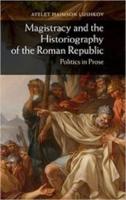
CUP (2015) h/b 201pp £65 (ISBN 9781107040908)
This is a book about Roman historical writing, in particular Livy’s massive work Ab urbe condita (AUC). It highlights two distinct features. The first is exemplarity, meaning the use of examples to illustrate principle. The second is the portrayal of magistrates. AUC is full of stories which exemplify the traditional Roman virtues. One of the most famous is the suicide of Lucretia. After she has been raped by Sextus Tarquinius, Lucretia in the presence of her father and her husband stabs herself to death. The Roman people are enraged and drive the Tarquins out of Rome. Lucretia’s self sacrifice is doubly significant. It manifests her chastity. It also leads to the foundation of the Republic, traditionally dated to 509 BC. Roman magistrates are central characters in AUC. They had a vast range of executive, legal, military and religious functions. These included maintaining the city, managing public finances, sometimes determining foreign policy, commanding armies and, of course, sitting as judges. Any modern student of ‘separation of powers’ would have a fit. But the Romans were quite happy with these arrangements, and Livy thought they were great. L. examines how Roman historians treated the magistrates. The historians’ style was exemplary. Two of the most famous stories involved a clash between loyalty to family and loyalty to the Republic. Perhaps unsurprisingly, the Republic won every time. In the first example, the sons of Brutus took part in a conspiracy to restore the kings. They were duly captured and sentenced to death. Brutus as consul had to preside over their executions. In the second example, Manlius Torquatus during the Latin Wars broke ranks in order to kill an opposing general in single combat. Despite that outstanding valour, it was still a breach of military discipline. Soldiers were not allowed to break ranks. Manlius’ father, Torquatus, was consul at the time. The elder Torquatus took a stern view of disciplinary breaches. He sentenced his son to death. Again our human rights lawyer would be appalled. Modern judges are meant to recuse them themselves whenever any conflict of interest arises. But the Romans were made of sterner stuff. The message of their historians was clear. Virtue always triumphed, and magistrates of the heroic age did their duty. AUC book 9 tells the story of the Caudine Forks. In 320 BC the Roman army was trapped. They made a humiliating peace treaty with the Samnites, by which the lives of the soldiers would be spared if they went under the yoke. Rome subsequently repudiated the treaty. In order to avert divine displeasure, Rome handed over to Samnium for retribution everyone who had been involved in making the treaty. Then, under new consuls, the Roman army returned to battle and crushed the Samnites. The consul Postumius is a central character in the saga. His blunder as military commander led to the initial defeat. Without authority, he committed Rome to a disastrous treaty. In the subsequent assembly debate, Postumius urged the Romans to renounce the treaty and to extradite himself and his colleagues. As Lushkov demonstrates, this story is an exemplary study of the institution of consulship. It shows Postumius’ failings in military command and foreign policy. It also shows him doing his duty by giving a lead in the debate and making an act of self-sacrifice. He thereby saved the day. L. examines the role of magistrates in the democratic process from two viewpoints: first, when they were standing for office; secondly when they were presiding over the election of their successors. AUC exposed the conflicts which the magistrates faced and recounted how these were resolved. Although Livy is the starting point for his analysis, L. frequently brings in the writings of Cicero and Plutarch. She shows how Cicero, using the exemplary style, deployed historical anecdote in order to illustrate or reinforce his arguments. This is an interesting and well researched book. It will appeal to both general readers and professional classicists. It has helped this reviewer to look at the Roman Republic and the writings of Livy in a new way.
Rupert Jackson
